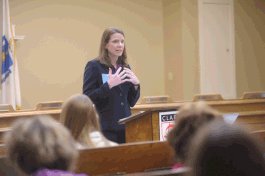Denise Hines Speakers Page

Research Associate Professor |
Specialized Topics:
|
Dr. Hines received a B.A. from the College of the Holy Cross in 1995, and an M.A. and Ph.D. from Boston University in 1999 and 2004, respectively. From 2003 until 2005, she was an NIMH Postdoctoral Research Fellow at the Family Research Laboratory (FRL) and Crimes Against Children Research Center (CCRC) at the University of New Hampshire, and from 2005 until 2007, she was a Visiting Assistant Professor in the Department of Criminal Justice and Criminology at the University of Massachusetts Lowell. Since 2005, she has been affiliated with the University of New Hampshire’s FRL and CCRC as a Research Associate. She has been at Clark since 2007.
Dr. Hines’ research centers on issues of family violence and how to connect such research with policymakers and practitioners. Her current research has three foci. First, she is the Principal Investigator on a series of studies investigating the physical and mental health of men who sustain partner violence from their female partners and seek help. The most recent of these studies also investigates the mental and physical health of child witnesses and is being supported by a grant from the National Institute on Child Health and Human Development. Her second area of research centers on the Clark Anti-Violence Education (CAVE) program, of which she is the co-director. This program offers free prevention and intervention services for sexual assault, dating violence, and stalking victimization, and Dr. Hines is involved in the evaluation of the effectiveness of the programs. Finally, Dr. Hines is the Director of the Family Impact Seminars, a series of annual seminars that translates social science research to state policymakers on issues related to families, broadly defined. Dr. Hines teaches undergraduate courses in Quantitative Methods, Psychological Perspectives on Criminal Behavior, Dating and Sexual Violence, and Research on Family Violence; a combined undergraduate and graduate course on Using Social Science Research to Influence Public Policy, and graduate courses in Statistical Methods.





